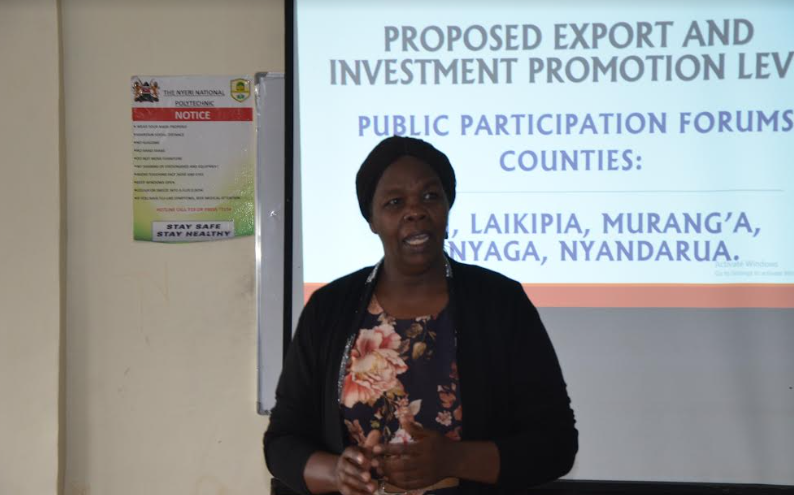The Government has been challenged to reflect about setting up of cottage industries to help absorb students graduating from Technical and Vocational Education and Training (TVETs) institutions.
Such a move, according to James Karigu, a member of the Kirinyaga Jua Kali Association will not only open up job opportunities for young Kenyans but also boost the country’s export of local goods.
Karigu who was speaking during a public participation workshop on the proposed Bill on Export and Investment Promotion Levy in Nyeri said the county will never address the existing trade inequality existing with industrial giants like China unless it taps on her own cottage industries.
“We are lamenting about the influx of cheap products into the country from China and other countries but we are still churning out graduates from our vocational training centers with no specific places where they can start utilizing their skills.
The Government should rethink on how those exiting from our technical training institutions can be assigned places where they can put their skills into practice and help bridge the current trade gap between Kenya and other countries,” he told participants who were drawn from Kirinyaga, Nyeri, Laikipia and Murang’a counties.
Among the key objectives of the Bill is to support export and investment promotion initiatives in a bid to tap into the country’s Sh. 450 billion annual export potential.
The levy will be charged on certain import goods and products which the local manufacturing industries has the capacity to produce.
According to the Ministry of Investment Trade and Industry, Direct Foreign Investments (DFI) as share of GDP has been declining in the manufacturing sector from 3.1 per cent in 2011 to 0.4 per cent in 2021.
Simon Kariuki who runs a light industry in Laikipia requested the government to organizing locally-bred exhibition centers where homegrown manufactures can showcase their products.
He said it is quite unfair for countries like China, Egypt and Turkey to host such exposition in the country where they advertise their merchandise while local manufactures lack a national platform where they can display their products.
“If the government wishes to promote local industries, let a national exhibition center be set up where we can showcase our products to the nation and international community. There is no reason for the country to be hosting foreign expos to promote foreign goods at the expense of local manufacturers,” he said.
Judy Karimi, a commercial poultry farmer from Kirinyaga County, said her main concern was how the levy would be of use for poultry farmers like herself.
Karimi noted that majority of poultry farmers were not well equipped to add value to their products given that most of them only slaughter chicken for sale.
“I would like to know how the bill can assist poultry farmers to do value addition so that we can take advantage of the export market,” said Karimi.
However, Josephine Waweru a coffee farmer from Kirinyaga County could not hide her disappointment at the omission of coffee and tea from the proposed levy.
She noted that while many coffee farmers in Kirinyaga County had joined in the coffee value addition chain, they were receiving little support from the government yet the cost of production was also very high.
“Many farmers in the coffee sub-sector are now venturing into value addition as a way of increasing their returns. Our main challenge is sourcing machines locally. Most of the ones that we use are expensive and despite the farmers venturing into value addition no one is helping them acquire these machines or even reducing the cost of production. My hope is that the levy will at least cut down the overhead costs so that we can make profits from our high-quality coffee,” said Josephine.
The government plans to support the local manufacturing sector to help raise its contribution to the GDP from the current 7 per cent to 15 per cent by 2017 and ultimately to 20 per cent by 2030.
The National Trade Policy targets to support value supply chains exports for local products including tea, coffee and textile from the current growth of 6 per cent to more than 25 per cent.
The move, among others, aims to reduce the country’s reliance on foreign goods and services and create a self-sufficient economy that is less vulnerable to external shocks.
Kenya’s export market made slight gains in 2021 when the country’s import stood at Sh 608 billion as compared to Sh 533 billion the previous year.
However, the value of imports rose from Sh1.34 trillion in 2020 to sh1.7 trillion in 2021, representing an increase of sh.0.36 trillion.
By Samuel Maina and Wangari Mwangi





